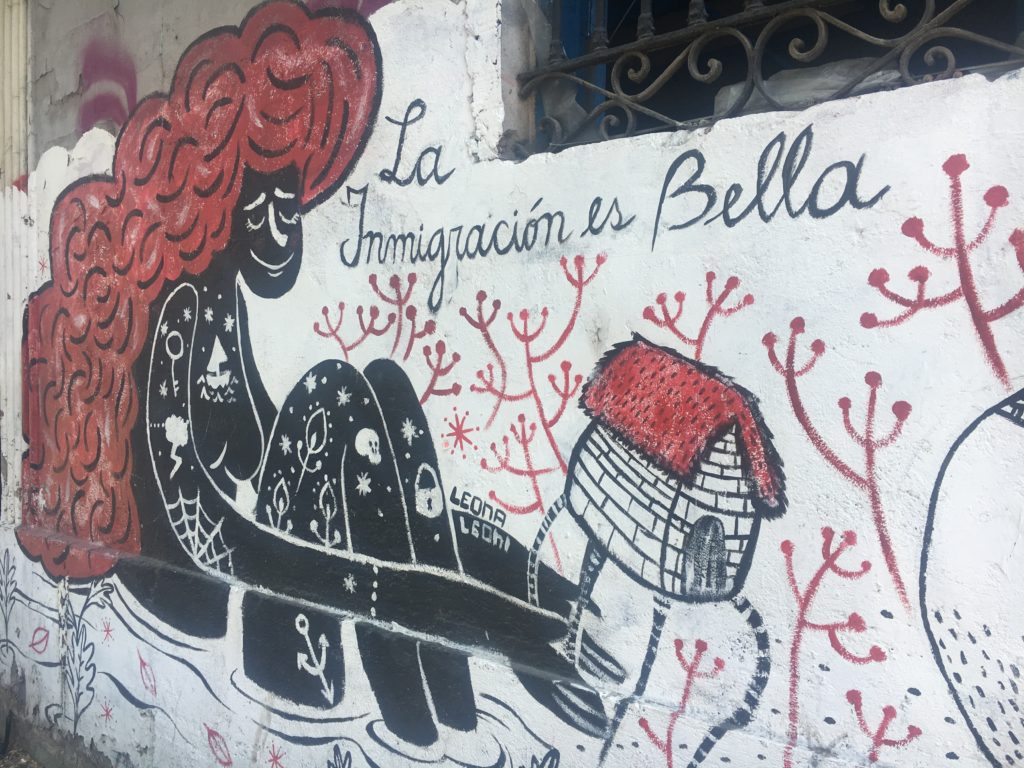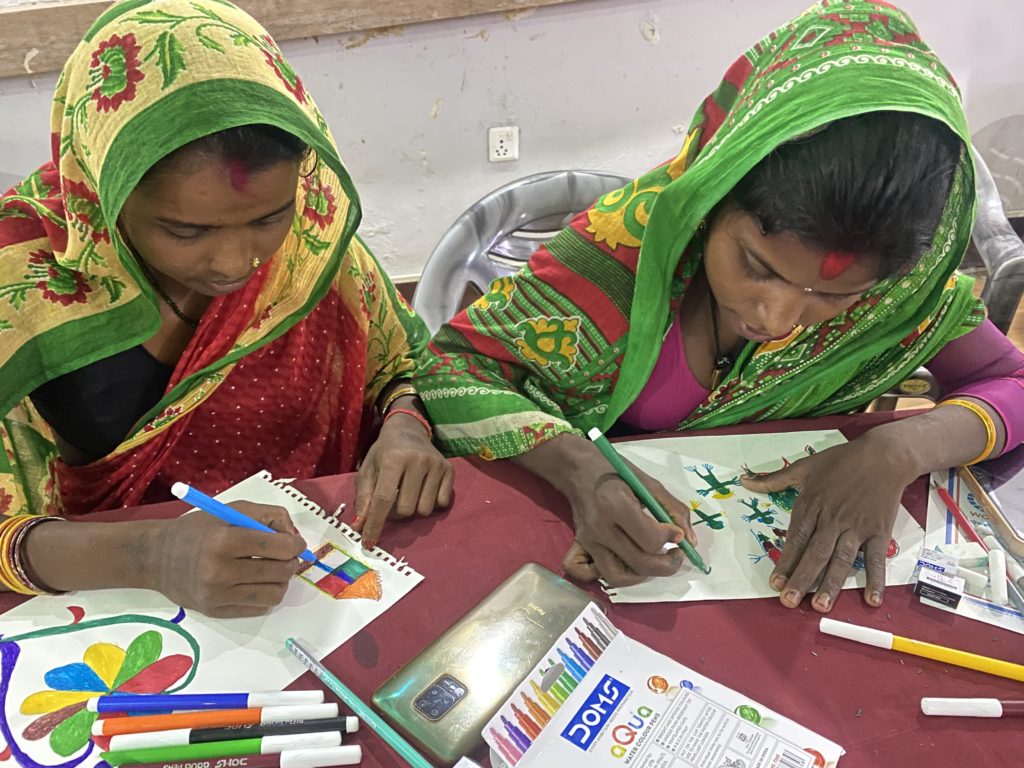Toni Cela (Interuniversity Institute for Research and Development (INURED) and University of Miami); Anita Ghimire (Nepal Institute for Social and Environmental Research (NISER); Meena Poudel (Independent researcher); Sarah Scuzzarello (SCMR, University of Sussex); Mary Setrana (University of Ghana); Marcia Vera Espinoza (Institute for Global Health and Development at Queen Margaret University, Edinburgh); Franzisca Zanker (Arnold-Bergstraesser Institute at the University of Freiburg)
Migratory movements occur in the context of hegemonic postcolonial power relations. These situated relations in turn, adversely affect the overall treatment of migrants on the move. The intersectional migrant experience based on racial, class, gender, sexual, and religious oppressions further compounds the hegemonic power structures. Feminist migration scholars, among others, have long discussed how to best understand and mitigate the effects of these intersections on the lives of migrants. With the newly emerging debates and practices out of the field of feminist foreign policy, we decided to hold a roundtable discussion at the 21st IMISCOE Annual Conference in Lisbon – in a hybrid manner – to consider what a feminist migration policy might look like and whether it is even feasible. This blog summarises our conversations and presents some of the key contributions of global feminist migration research. Drawing on our discussion as well as our own research and political practices, we make a case in favour of transforming migration research and policy through better listening, advocating, and research design.
A strong foundation for gender in migration research
In recent decades, gender-specific migration research has gained momentum. Through this research, feminist academic practice has made the many women who migrate in contexts like South Asia, West Africa, and Latin America more visible. This scholarship has developed our understanding of migrants’ situated intersectionality across locations and social contexts. It has also made clear the influences of migration governance and migration categorisations on the lives and mobility of female migrants.
The feminisation of migration is based on family strategies of economic survival, suggesting complex and collective decision-making processes that take place across time. Power and marginalisation shift depending on the geographical, social, and temporal location in which migrating populations live. This can range more generally from a lack of access to sexual and reproductive health for displaced women, to the effects of gender blind policy implementation for long-term integration. Feminist research has pushed the boundaries of our understanding in debates on smuggling and trafficking, conversations on indentured sex work and migration and dialogues on the gendered nature of migration governance. Research has uncovered how gendered caretaking responsibilities exacerbate female immobility, as well how states can impose normative practices of motherhood onto migrant mothers. Others have considered what transnational mothering from abroad can look like. To some extent, migration has empowered women and enabled them to renegotiate gendered power structures back home. Yet, these structures have not gone extinct; on the contrary, they persist. The structural realities both at home and in migrant’s host countries reinforce certain types of gender dependency and subject individuals to gender-based forms of prey/oppression.
A major contribution to the migration literature from feminist research has been the analysis of practices of resistance. We want to emphasise the work by Amarela Varela for example, who has explored what she calls the “sociology of migrant struggles”, or luchas migrantes. Varela analyses migrants’ collective actions that challenge both the State and society at large. While such struggles take different forms and enact diverse aims, they tend to develop a critique of racism and xenophobia while contesting border regimes and redefining the normative frameworks of social recognition. Resistance work is often collective and strongly informed by feminist approaches.
Gaps of course exist. Global South based and focused research is still not clearly visible in the literature. Similarly, research on masculinities has a long way to go. An equally important gap in research concerns LGBTQ+ migrants and refugees and the analysis of how border regimes and social boundaries reproduce hetero- and cisnormative power structures is burgeoning. Beyond the research field, heteronormative, cisnormative, racialised, class-based, and post-colonial power structures continue to shape migration governance and the experience of migration. In research and policymaking, gender (if included at all) is a variable instead of an analytical tool. More research needs to be undertaken to change this, but what can we change beyond that?
Feminist Futures – possibilities and tensions
Migration policy is at best about regulation and at worst about control. Embedded into the neoliberal capitalist world order that dictates who can move and when, migration and its regulating policies are founded on racialised and postcolonial ideals. An intersectional feminist migration policy has the potential to challenge this. It would shed light on the complex intersecting systems and structures of power that shape mobility opportunities. As such, an intersectional feminist migration policy would be not only transformative, but we believe, it would also encourage a new framing of migration. Its focus would be on human security which would not be pitched against receiving states’ national security, and a key focus would be on the root causes of why people emigrate in the first place. Through a feminist-informed migration policy, mobility would become possible outside of a spectre of violence. Borders would no longer be violently enforced rather they would be enablers of movement and safe passage. Migration would become a choice instead of being imposed as one’s only chance for survival or a better life. Importantly, women who would like to migrate would be able to do so without the fear of stigmatisation and high protection risks. People on the move would be looked after, cared for, and ensured a safe passage rather than an ‘orderly’ one. The needs and desires of migrants would be the focus of a feminist migration praxis, and they would be seen as individuals rather than being defined by a particular legal status.

There is, however, a tension between the ‘what it is’ and the ‘what could be’. We are currently stuck at a crossroads between contemporary policies and feminist transformative principles. How can we transform migration, not just in terms of research, but also practice and policies? We argue we need to better listen, advocate and research.
1. We need to listen
First, we need to make space for, listen actively to, and learn from the voices of refugees and migrants. They need to inform – and be part of – research, policy, and governance infrastructure. Their experiences should be the central force guiding our understanding of migration. Second, we need to become better at listening to those who fear migration and refugees. Listening to see what their fears are actually about (e.g. access to healthcare, school, food, and livelihoods) so that we can foster constructive conversations where possible.

2. We need to advocate
According to Amina Mama, feminist theory is “most relevant when it is rooted in activism.” We need to advocate from a space of “inclusive resistance”, from a collective feminist approach. We advocate for migration policies that aim for transformation rather than a slight improvement to our heteropatriarchal status quo. A starting point for this is calling for a different narrative, one that does not see migration as a problem. To achieve this, we need to advocate for changes to our news outlets to become complicit in creating an atmosphere of solidarity. We additionally advocate for an acceptance that mobility is a fact in human history and part of global change. We need to acknowledge that contemporary migration governance and policies are developed with the socioeconomic interest of the Global North in mind. We need to identify and network our feminist allies in government bureaucracies, agencies and amongst policy-makers. Whilst there is no consensus on whether we seek a borderless world, we are in consensus on the topic of human rights-based pathways for regular migration. We imagine a world where there are consistent and equitable processes for regularization for undocumented migrants (e.g. permanent residence, affordable citizenship pathways, and meaningful participation in civic and political life). We need to advocate for a future where productive and reproductive labour are recognised as equally important. With this, we ultimately envision a feminist-informed version of labour rights that are fundamental to international labour standards, protection, and development.
3. And yes, we need to research (better)
Methodologically speaking, in particular, quantitative survey data still suffers from an androcentric bias – both in terms of variables chosen and how we interpret quantitative findings (i.e. recognizing the gendered structures shaping male and female migrants’ lives rather than attributing outcomes to individual choice).
A larger question is, however, how we research and produce knowledge: we need to carry out slow research, beyond funders’ restrictions. That is to say, we need to conduct research based on collective action with a careful consideration of the varying privileges that cut across research collectives. There are examples of research collectives based on feminist research principles, including the Narrativas de Fronteras (Border Narratives) a Latin American collective that aims to exercise epistemological self-care while, at the same time, practising ‘sentipensante’ (sensing/thinking) activism, or the group CAMINAR – comparative analysis on migration and displacement in the Americas, who came together during the pandemic. The latter has been trying to work outside, although still rooted within, the boundaries of neoliberal academia conducting research with no funding and publishing in multiple languages. Another small international pilot research project brought together researchers to discuss and draw out how migrant communities in the Global South, namely in Mexico, Nepal, Qatar, and Zimbabwe, were affected by, and reacted to the pandemic.
Such multi stakeholder collaborations within the Global South have to be strengthened, and their work promoted, in order to create contextual knowledge on the various dimensions of migration such as transformative gender approaches, feminist research methodology relevant to migration research and inform transformative policymaking.


Leave a Reply